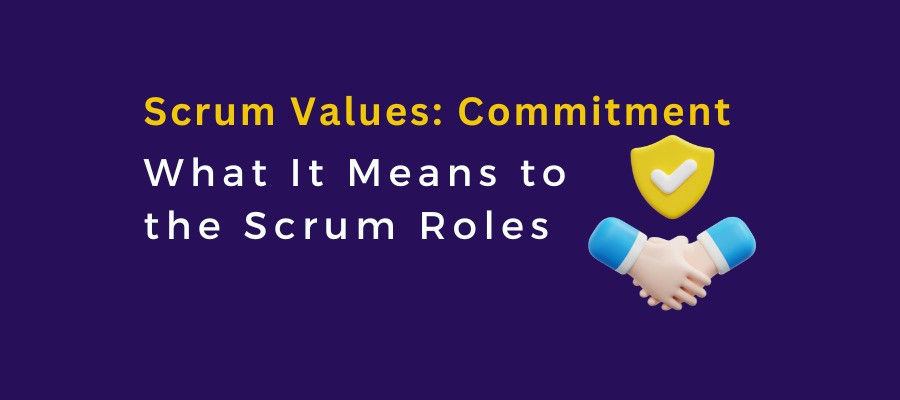Scrum Values: Commitment - What It Means to the Scrum Roles

Among all Scrum values, many get confused with “commitment.” Many think it’s about delivering every single task or feature, no matter what. But that's not the point. Commitment in Scrum is about much more than checking off a list of functions; it’s about dedication to the process, to the team, and, ultimately, to the product’s success. Let's dig into what commitment truly means for each Scrum role and how it fuels a successful Scrum Team.
What Does Commitment Mean in Scrum?
Commitment is about the team's dedication to the Product and Sprint goals. It's about supporting each other to achieve these goals, even when unplanned. Because in a complex and constantly changing environment, things rarely go as planned.
Commitment is not about:
- Delivering every Product Backlog item in the Sprint, no matter what.
- Promising that nothing will change during the Sprint.
Instead, commitment in Scrum is about being flexible enough to adapt while staying focused on the goals. It's about delivering a "Done" increment that meets the Sprint Goal, even if unexpected challenges arise.
How Does Commitment Drive The Scrum Team?
A Scrum Team commits to working together towards common goals. This shared commitment creates an environment where trust flourishes, problems are solved more creatively, and the team continuously improves.
Here’s how commitment manifests in practice:
- Commitment to Success: It's about individual achievements and the team's overall success. When everyone commits to the team's goals, trust builds, and team standards naturally rise.
- Commitment to Transparency and Adaptation: Committing to Scrum entirely, not just picking the easy parts, allows for absolute transparency, inspection, and adaptation. That’s when the magic happens.
- Commitment to Continuous Improvement: Committing to improving daily makes it easier to pivot or change direction when new data or feedback arrives.
Scrum Roles and Their Unique Commitments
Now, let's explore what commitment looks like for each Scrum role.
Product Owner: Committing to Value
For the Product Owner, commitment means making the tough calls. It's about optimizing the product's value, not just making every stakeholder happy. This role requires a keen focus on prioritizing the backlog to maximize the return on investment. A Product Owner demonstrates commitment by refusing to include features that don’t add significant value and ensuring every decision aligns with the Product Goal.
Developers: Committing to Quality
Developers show commitment by ensuring that every increment meets the definition of “Done.” It’s not just about getting things “almost done” but delivering a complete, shippable product. Developers commit to a shared understanding of what “Done” means and strive to meet that standard every time.
Scrum Master: Committing to the Framework
The Scrum Master’s role is to ensure the team doesn’t cut corners, even under pressure. They don’t extend time-boxes or allow deviations from Scrum just because it seems convenient.
How Do The Scrum Elements Promote Commitment?
Scrum has built-in elements that promote commitment, and these are worth highlighting.
Delivering a “Done” Increment
Every Sprint is about delivering the “Done” increment to meet the Sprint Goal. This promotes a commitment to quality and continuous improvement. The team commits to high standards and constant improvement by focusing on providing a complete increment.
The Daily Scrum
The Daily Scrum is crucial for developers to show their commitment to each other. It’s a time to inspect and adapt the plan, ensuring the team remains on track. During the Daily Scrum, developers determine the best way to meet the Sprint Goal after rigorous inspection.
The Sprint Retrospective
The Sprint Retrospective is all about continuous improvement. It’s an opportunity for the team to inspect its processes, tools, and interactions and identify actionable improvements. A team that regularly reflects on its work and looks for ways to improve shows a deep commitment to its growth and success.
Final Thoughts!
Commitment isn't just about promising to do work; it's about dedicating oneself to the team's and the product's success. It's about staying flexible, transparent, and focused on continuous improvement. By committing to these principles, Scrum teams position themselves for success in even the most complex environments.
Remember, Scrum is not about doing everything perfectly. It’s about striving for excellence, learning from mistakes, and growing together as a team. When every role understands its unique commitment, the entire Scrum process becomes more effective, and the product truly shines.
Reference:
The Scrum Values and the Real World | Scrum.org



